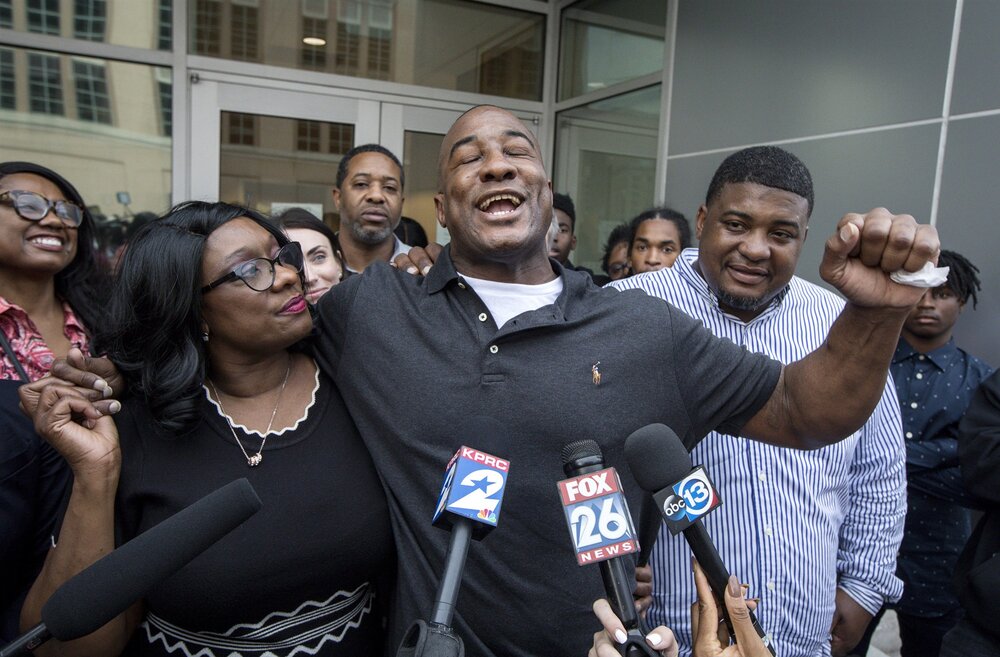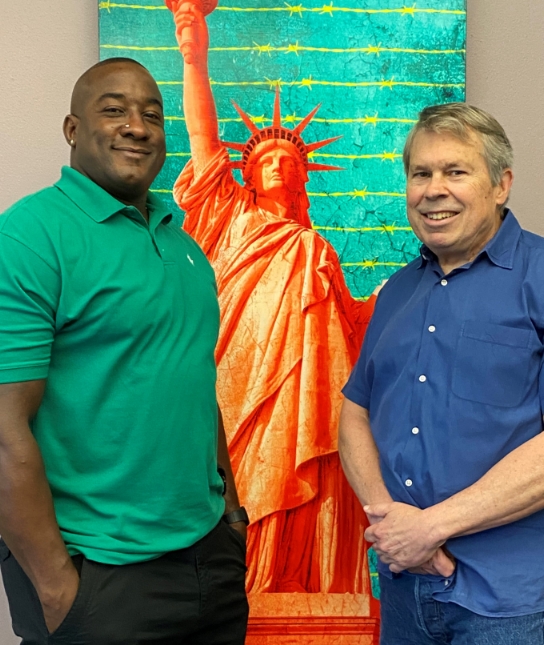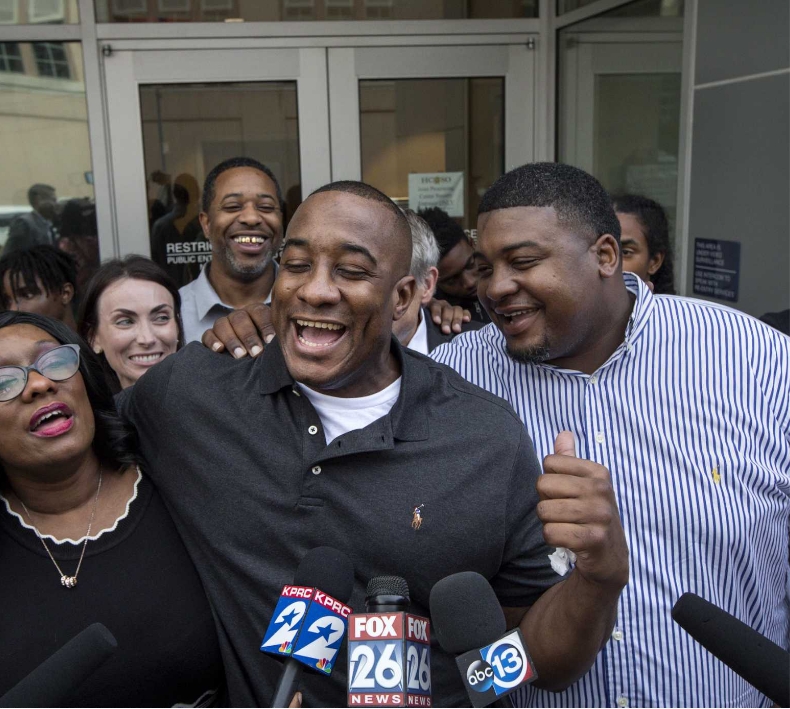
- CHARGE
- Murder
- CONVICTED
- 2012
- SENTENCE
- Life
- RELEASED
- 2019
- COUNTY
- Harris
- EXONERATED
- 2021
Background
Shortly before midnight on December 10, 2010, 28-year-old Aaron Scheerhoorn, was stabbed outside of a nightclub in Houston. Several people told police they saw all or portions of the attack. The witnesses included three club bouncers, one bar staff member, three patrons, and one passerby.
The following night, the staff member called Crime Stoppers to report that he saw a man who he thought looked like the attacker. Wells saw the man get out of a car across the street from the nightclub and walk away. He then went to the car and wrote down the vehicle identification number (VIN). Police traced the VIN number and discovered the car was registered to 33-year-old Lydell Grant.
Police then assembled a photographic array that included Lydell Grant and showed it to the various witnesses. Two of the bouncers, identified Grant as the attacker. The third bouncer did not identify anyone. Two of the patrons, Brittany and the passerby also identified Grant as the attacker based on the photo lineup that was administered by the investigating officers.
Arrest & Trial
On December 15, 2010, a Houston police officer stopped Grant for a traffic violation and discovered there was a warrant out for Grant’s arrest. Based on the witness identifications, Grant was charged with first-degree murder. All six of the witnesses identified Grant in court as the attacker, although one would only say that Grant “looked like” the attacker.
Houston police crime lab DNA analyst Priscilla Hill testified that she conducted the analysis on the fingernail scrapings from the victim. Hill testified that she could not exclude Grant from being a potential contributor to that DNA.
In Grant’s defense, a witness testified that he and Grant spent a significant amount of time together on the night of the murder. The witness, who Grant had met that night, said there were no gaps of time where Grant was out of sight and thus could not have committed the crime.
On December 6, 2012, the jury convicted Grant of first-degree murder. He was sentenced to life in prison. His conviction was upheld on appeal in 2014.



Release
In the spring of 2018, IPTX began reviewing the case. In February 2019, IPTX obtained the pre-trial DNA case file from the Houston Forensic Science Center. Review of the DNA analysis seemed to indicate that Grant had been excluded from the DNA mixture found under the victim’s fingernails. Under that interpretation, Hill’s testimony that she could not exclude him was incorrect.
IPTX provided the data files to Cybergenetics Corporation for analysis. On March 29, 2019, Cybergenetics completed its probabilistic genotyping computer analysis of the raw data files and reported that the DNA of Scheerhoorn and an unidentified person were found. Grant’s DNA was not found, Cybergenetics reported.
At the request of IPTX, the unidentified DNA profile was submitted to the FBI’s Combined DNA Index System (CODIS). The search of the database found that the unidentified DNA profile from the fingernail scrapings was similar to the DNA profile of 41-year-old Jermarico Carter. IPTX determined that Carter had been in Houston at the time of the crime and had been arrested a year before the crime at a location very near where the murder took place.
In June 2019, Grant’s defense team, headed by Mike Ware and the prosecution agreed that the Texas Department of Public Safety (DPS) would conduct new DNA tests on the knife recovered from Grant’s car as well as the fingernail scrapings. The testing confirmed the report from Cybergenetics.
On November 26, 2019, Grant was released on bond. Less than a month later, in December, Jermarico Carter was arrested in Georgia on other charges. Houston police interviewed Carter and he confessed that he had stabbed the victim following an altercation on the street.
At the time of Grant’s release, Houston police Chief Art Avecedo said, “On behalf of the Houston Police Department, I want to extend an apology to Mr. Grant and his family as they have waited for justice all these years.”
Exoneration
IPTX and the prosecution joined in presenting a state law petition for a writ of habeas corpus to the trial court asking that Grant’s conviction be vacated. The writ was approved by the trial court and sent to the Texas Court of Criminal Appeals.
In 2020, despite DNA evidence clearing Grant of the murder, identifying Carter as the perpetrator and Carter’s confession, the Texas Court of Criminal Appeals requested that the trial court produce affidavits from the witnesses who identified Grant at trial. The appeals court also asked for photographs of Carter and a copy of the recorded interview with police during which Carter admitted committing the murder.
Subsequently, only one of the witnesses could be located—Andrew Vu, one of the bouncers at the club who had identified Grant at the trial. Vu said that the day police came to him with the photographic lineup,
“I told them I didn’t see the guy, but they said to look again, because he was in there and three other people had already picked him.” Vu said, “I picked Mr. Grant, even though I did not really feel he was the guy. However, I talked to my co-workers afterward, and they were all sure Mr. Grant was the person, so I agreed. Because my co-workers believed it was Mr. Grant, I thought I was the one making a mistake.”
In February 2021, an amended application for a writ of habeas corpus was approved and forwarded to the Court of Criminal Appeals. On May 19, 2021, the Court of Criminal Appeals granted the writ and vacated Grant’s conviction. “The entirety of the record now supports the agreed recommendation to grant actual innocence relief.” On May 27, 2021, the prosecution dismissed the case.

